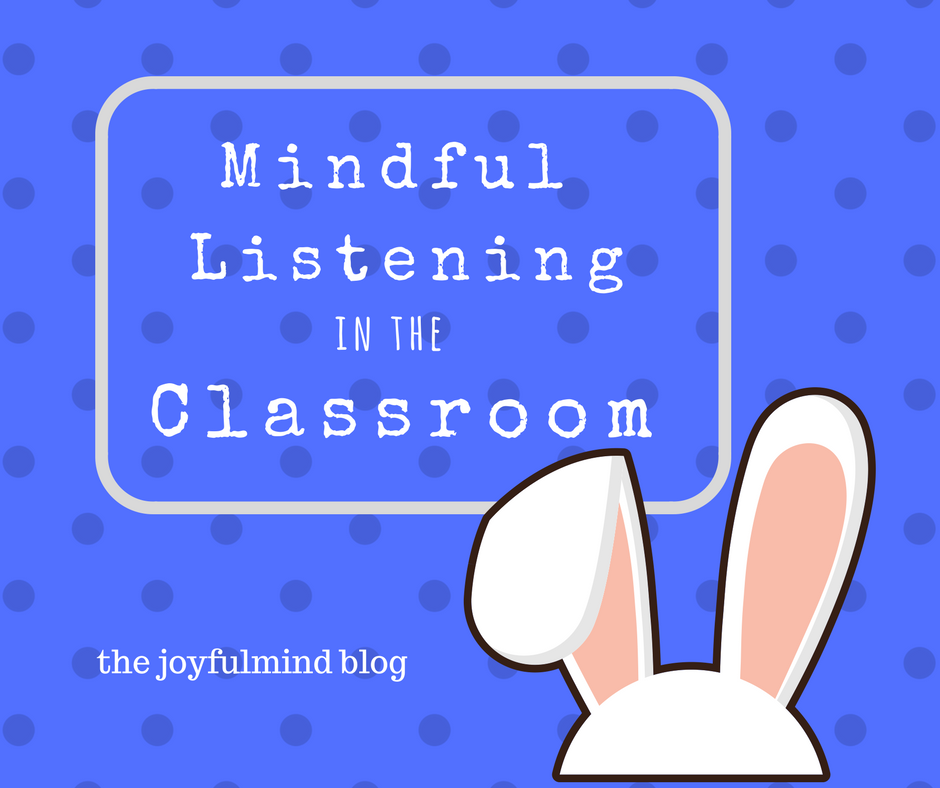JOYFUL MIND WELLBEING
|
Want to know how Mindful listening practices could transform your classroom? It’s simple: The very act of mindful listening, or any sensory focus for that matter, strengthens attention. When children stop and focus intently on sensory input, be it seeing, hearing, smelling, tasting or touching, the focusing systems of the brain get a workout. The attention muscle grows. WHAT DOES MINDFUL LISTENING LOOK LIKE? Ask your students to settle and once they are still(ish) direct them to listen to the different sounds around them. (Having eyes closed can make it easier.) Can they find five different sounds? Are they soft or loud? Near or far? Artificial or natural? Can older children find the silence between the sounds; or the sounds within the sounds? Keep at it for 3-5 minutes then invite the children to report their findings back to the group. They could also sketch their sound discoveries, or fill in a tailored sound chart. Practise Sound Detective regularly in the classroom to get that attention muscle pumping. R.A.S. BRAIN FUNCTION Mindful Listening reinforces a part of the brain called the reticular activating system (R.A.S.). The RAS has the function of filtering out superfluous or peripheral information; it enables singular focus. That’s how come you can focus on this page despite the paraphernalia of the outside world blaring around your screen. On the other hand, if you’re not quite focussed, it’s your RAS letting extraneous content distract you. The brain cannot process all the millions of bits of information it receives all at once. RAS comes to the rescue, and we can improve the function of the RAS through Mindful Listening. STRENGTHENING ATTENTION Deliberate mindful listening gets inside your students’ brains and strengthens their attention muscle from the inside. How’s that for a helpful outcome. With regular practice of focusing on specific details, children can train the RAS to be more effective. It’s especially important for children who have trouble focusing their attention on their work, instructions, or social cues. THE MINDUP CURRICULUM The informative MindUP curriculum (Scholastic) recommends demonstrating RAS function in the classroom by running sand through a kitchen sieve. Add pebbles, to illustrate how extra stuff stays at the top and doesn’t filter through. Much like the RAS which allows through only certain information. The process comes down to neuroplasticity: practising paying attention improves attention. It builds the attention circuits in the brain. TIPS FOR THE CLASSROOM from The MindUP Curriculum Mindful listening is of two types: (1) structured listening with the purpose of building the attention muscle and (2) listening for social and emotional learning, which lays the groundwork for social awareness and effective communication. STRUCTURED LISTENING Mindful listening practice. Find a helpful guide from Meditation in Schools at A 10 Step Guide to Mindful Listening Listen to the gong fading. A helpful guide from Left Brain Buddha: Teaching Mindfulness to Kids: Mindful Listening Guess the Sound Another structured practice involves the teacher making sounds with objects hidden from view of the class (behind a screen or in a bag). You could crinkle or tear paper; shake tacks in a jar; clap your hands, clear your throat, shuffle cards or download sound effects from the internet. LISTENING FOR SOCIAL AND EMOTIONAL LEARNING Puppet roleplay friendly/unfriendly voice Younger children can role-play a conversation between puppets, who communicate first in a mindful, unfriendly way and then in a mindful/friendly way. Repeat verbatim Middle Primary kids can pair up and repeat verbatim a statement said by their friend. Mindful listening is useful in conflict resolution, as it allows the correct details to emerge while giving the listener a chance to calm down and reflect. It is particularly helpful for students who react too quickly. “I can’t talk right now” Upper Primary students will find it interesting to express the phrase “I can’t talk right now” in a variety of different tones. Discussion follows to underpin how words gain an emotional charge from the way we intone them. Listen to a piece of music and pick the instruments Play a music track that contains a variety of different instruments easy to identify. I like Imelda Staunton’s rendition of the Julia Donaldson song, The Dog and the Bone. (I can’t find a download link but check your local library for a cd.) Of course, the sky is the limit for music choice. Conducting voice levels The teacher can perform like an orchestra conductor, closing the hands together to elicit a soft voice from the students (repeating, for example, the syllable Ah) and progressively wider for louder vocalisation. Snap clap Older students can try an auditory rhythm exercise: clap, clap, snap, clap, snap, clap, evolving into increasingly challenging patterns up to 6-8 beats. Perform in groups of 6-10 and return to base beat between each new rendition. Whisper Words Remember the fun of sending a sentence down a line of people and the excitement of hearing how it had changed by the end of the line? Little did we know, thirty or forty years ago, the extent to which the activity honed the attention muscle, improved listening skills and contributed to socialisation. It’s a shame that activities for building the learning muscle, such as games, art, drama and music are under-valued in today’s crammed school curriculum. I encourage you to introduce Mindful Listening into your Classroom, make it a regular feature, and track the results. I’d be really excited to hear how it goes! copyright Shakti Burke 2017 Like it? Share it! Mobile users click url to enable 'comment' feature. I love hearing from my readers. I’d love to hear from you !
0 Comments
Leave a Reply. |
Categories
All
Categories
All
|
ServicesYoga Online
Mindfulness Coaching |
|

 RSS Feed
RSS Feed